Recently, it has been found out that developers are trying to copy ChatGPT to scam people via a researcher named Andrew Brandt from Sophos which is a cybersecurity team. He noticed an advertisement on a mobile news application for an Android app which is called “Chat GBT.” The advertisement included a logo resembling the OpenAI logo used for ChatGPT. The developers of the app claimed that it is an alternative to ChatGPT and stated that they have trained a model called Chat GPT.
Thus, it seems that the developers of the “Chat GBT” app are trying to create a similar chat application to ChatGPT, which is a language model developed by OpenAI. They have anointed their model “Chat GPT” to indicate its similarity or compatibility with OpenAI’s ChatGPT.
Furthermore, Sophos’ researchers have identified a deceptive practice used by certain apps. The pursuit of these apps is to deceive people into subscribing to their services and then make it difficult for them to unsubscribe or believe that uninstalling the app would be sufficient to cancel the subscription. In addition to this tactic, the developers of these apps furthermore engage in other deceptive behaviors such as faking app reviews and comments, as well as boosting download numerals.
Consequently, this type of deceptive practice is desired at misleading users and potentially exploit them financially. By furthermore making it hard to cancel subscriptions, users may unknowingly continue to be charged for the service even if they no longer want or use it.
Besides that, Sophos has coined the term “fleeceware” to represent the category of scam apps such as Chat GBT that engross deceptive practices. If you don’t know what fleeceware is. Read on to find out.
What do you mean by Fleeceware?
Fleeceware are apps that commonly employ aggressive advertising techniques, bombarding users with ads in a shot to pressure or persuade them to sign up for a subscription for functionalities that are available for free. The ads may be persistent, pushy, or devised to create a sense of urgency or necessity.
The intent behind these tactics is to manipulate users into subscribing to the app’s services without fully understanding the terms or the actual value of the offerings. By overwhelming users with advertisements and potentially misleading information, these apps aim to generate a high number of subscriptions and subsequently profit from unsuspecting users.
Also Read- 12 Ways To Earn Money With The Help Of ChatGPT
Fleeceware (FleeceGPT) or Fake ChatGPT Apps That You Need To Beware Of…
According to Sean Gallagher, a top researcher at Sophos, scammers have historically been quick to exploit popular trends and new technologies to deceive people and make illicit profits. ChatGPT, being a prominent AI language model, is no exception to this pattern.
As interest in artificial intelligence (AI) and chatbots resumes to ascend, users are increasingly seeking out related applications. Scammers take the edge of this heightened interest by creating and distributing fraudulent apps that resemble ChatGPT. They exploit the popularity and demand for such AI-based chatbots, desiring to trick users into downloading their deceptive offerings.
With the Apple App Store and Google Play Store being widely used platforms for app distribution, scammers target these stores to distribute their fraudulent ChatGPT-like apps. Users who are eager to explore AI and chatbot technology may unknowingly download these counterfeit apps, potentially falling victim to scams or privacy breaches.
Therefore, Sophos has discovered five apps that engage in deceitful practices on both the Google Play Store as well as the Apple App Store. Hence, down below are some of the app titles that you should disregard downloading or subscribing to.
Also, some of the apps have been removed or their title might be changed, but we have gathered some additional apps from PlayStore too just to give you an idea of how these apps appear.
Also Read- 5 Ways To Control ChatGPT With Your Voice
#1. Chat Open GBT- Open AI Chatbot
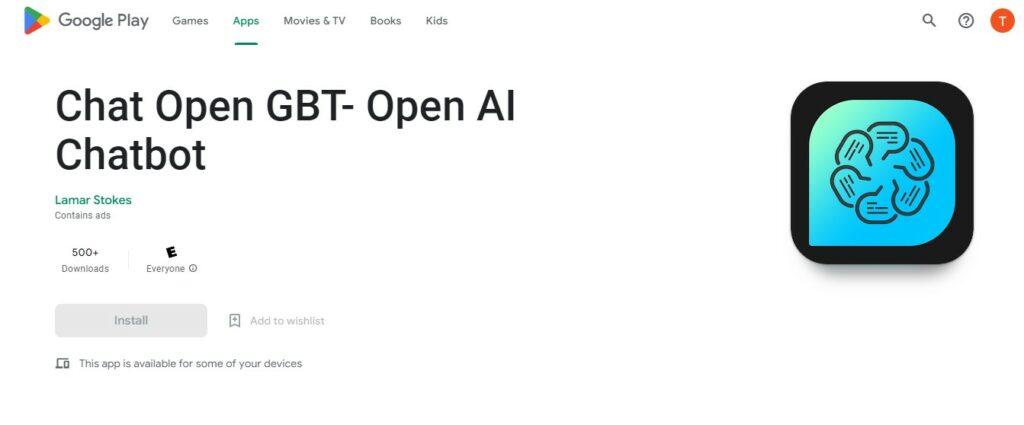
#2. ChatOn – AI Chat Bot Assistant
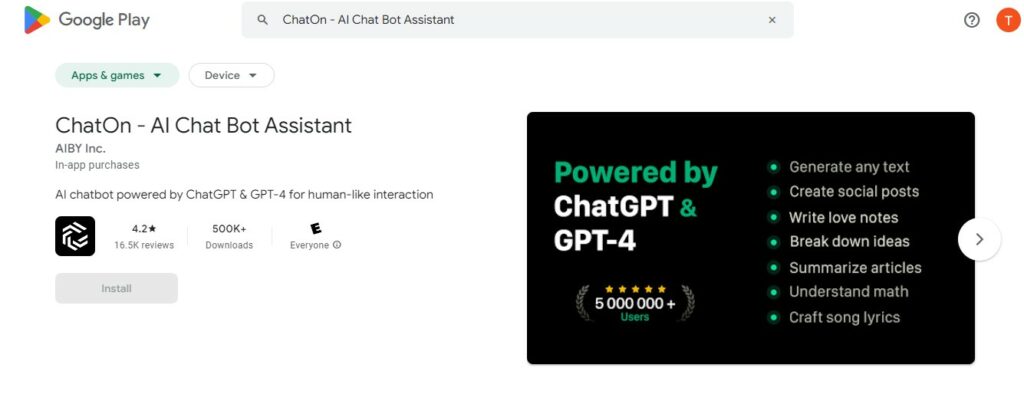
#3. AI Chat: Apo Assistant Chatbot
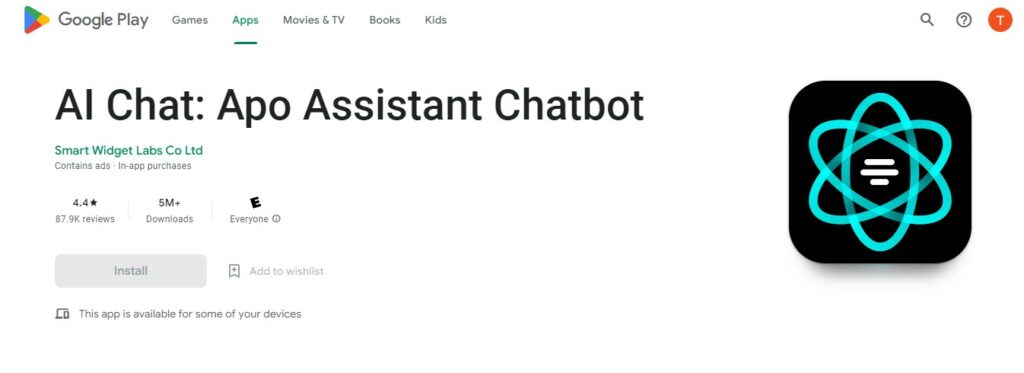
#4. Genie – AI Chatbot
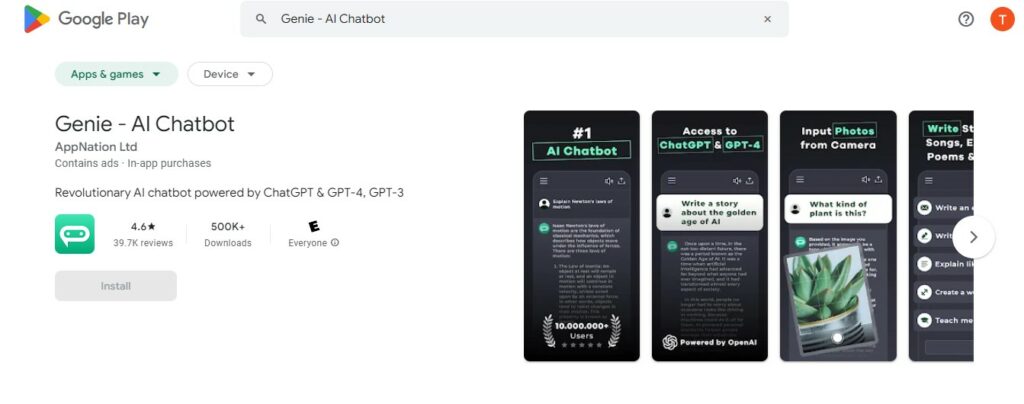
#5. ChatAi GDT – Ai Chat, Ai Bot
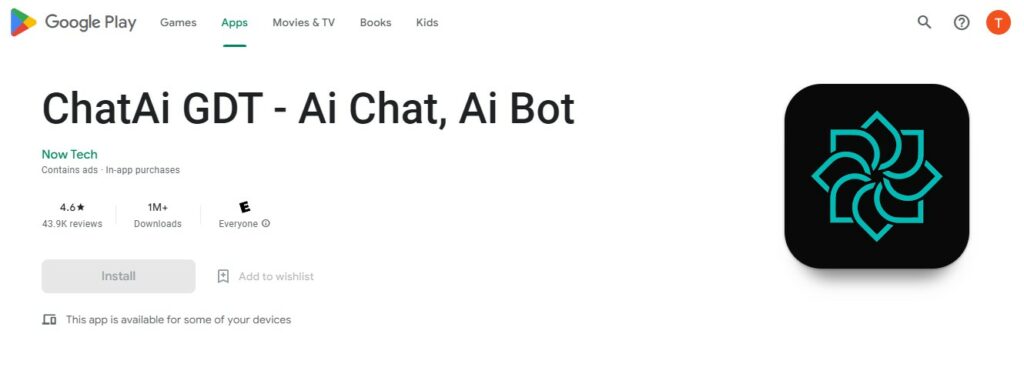
The discovery of counterfeit ChatGPT apps serves as a valuable reminder to exercise caution and remain vigilant while downloading applications. Prior to installing any app, it is essential to conduct thorough research and exercise skepticism towards apps that appear excessively promising or unrealistic in their claims. Although, these apps do not harm your device or extract your information. Still, if you can use the Chat GPT without any cost and just for free so why rely on such apps?
Also, if you have already downloaded these apps or apps that look like the ones noted above, you require to uninstall as well as cancel your subscription as only installing will not help you.
On App Store, you can cancel your subscription by:
- Heading to the “Settings” app on your iOS device, and tapping on your “Name”. After that, you need to click on “Subscriptions” and then click on “the subscriptions”. Finally, you require to click on “Cancel Subscription”.
Also, it may require you to scroll down within the app’s interface to find out the Cancel Subscription option. If you are unable to find a Cancel button or encounter a red text message indicating expiration, it indicates that the subscription has already been canceled.
On Play Store, you can cancel your subscription by:
- First, you need to proceed to your “subscriptions in Google Play“. After that, you have to select the subscription you like to cancel. Then, finally, you need to click “Cancel subscription”, and after that adhere to the instructions.
Furthermore, for your convenience, we have added a few tips to guide you on how to avoid such apps, adhere to these tips so you don’t get scammed out of your money.
Tips To Avoid Downloading Fleeceware Apps
#1. Verify Developer Credentials
Confirm the developer’s identity when considering a chatbot app. As we know, OpenAI is the sole and original developer of ChatGPT, so any different chatbot apps on the App Store or various other chatbot apps on the Google Play Store are devised by distinct devs. You have to analyze the developer’s profile on the App Store to learn about their other apps and accumulate more info about their firm.
#2. Assess App Permissions for Privacy Risks
Take a close look at the app permissions before installing any ChatGPT-related app. Some apps may have unnecessarily extensive permissions that pose a risk to your privacy.
#3. Beware of Costly In-App Purchases in “Free” Apps
In some apps, particularly those labeled as “free” to download, it is essential to be cautious about potentially costly in-app purchases. While the initial download of the app may be free, the developers may propose further features, content, or functionality that can solely be accessed through in-app purchases. These purchases furthermore often involve spending real money, and the costs can accumulate significantly if you frequently engage with the app or make frequent purchases. Consequently, it’s substantial to carefully review the app’s description and look for the title of “in-app purchases”.
#4. Survey App Reviews
Be cautious when relying solely on app reviews. Often, fake app creators pay for positive reviews, pushing them to the top of the review section, and creating a favorable impression. To gain a more accurate understanding, dig deeper into the reviews section. Pay attention to one and two-star reviews as they typically provide more honest feedback. This approach will furthermore help you make a more informed decision about whether to install the app.
Conclusion
In conclusion, the emergence of deceptive apps posing as ChatGPT highlights the ongoing efforts of scammers to exploit popular trends and technologies for financial gain. These fraudulent apps employ various tactics, including assertive ads, and tricky subscription practices. But, by staying vigilant and informed, you can navigate the app landscape more securely and make well-informed decisions while enjoying the benefits of innovative technologies like ChatGPT.


























![The Apex Legends Digital Issue Is Now Live! Apex Legends - Change Audio Language Without Changing Text [Guide]](https://www.hawkdive.com/media/5-Basic-Tips-To-Get-Better-On-Apex-Legends-1-218x150.jpg)










